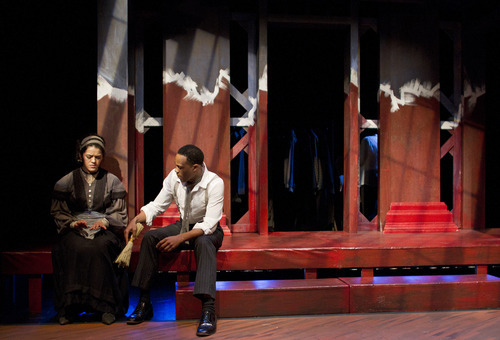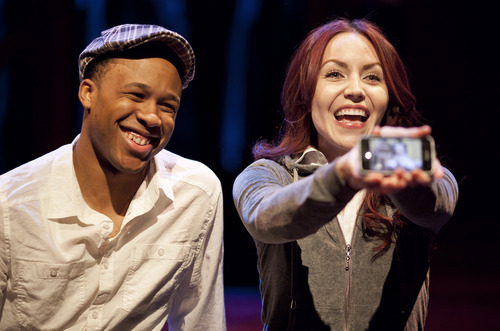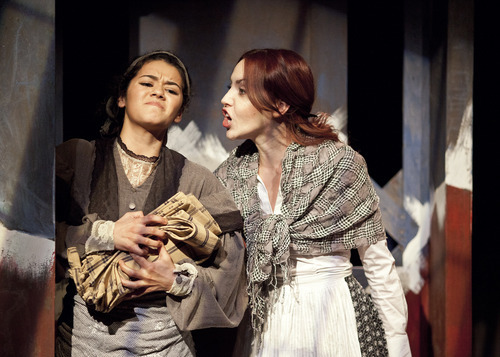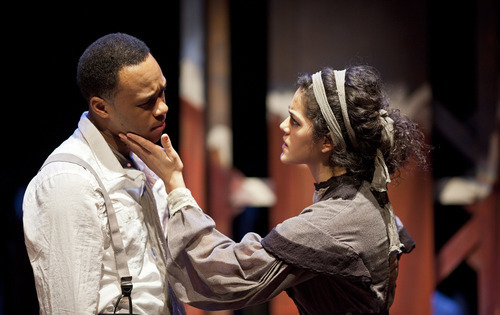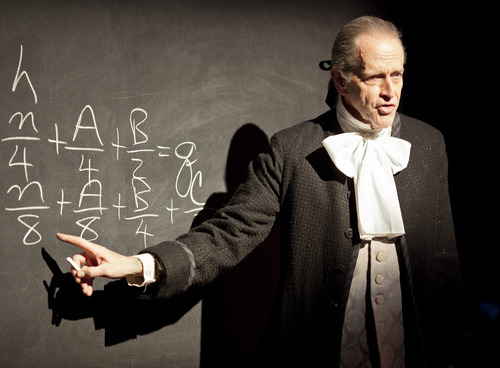This is an archived article that was published on sltrib.com in 2012, and information in the article may be outdated. It is provided only for personal research purposes and may not be reprinted.
What is race? Does it have to do with color? Is it defined by blood? How does it relate to the way we shape our identity or form attachments, especially sexual ones, with other people? These are some of the provocative questions posed by Debora Threedy's eloquent "The Third Crossing," making its world premiere at Plan-B Theatre Company.
The play examines the complex, ambivalent interplay between whites and blacks, especially in the American South, through the prism of the relationship linking Thomas Jefferson to Sally Hemings, the slave who bore at least five of his children. Jefferson never acknowledged the children, and we know very little about Hemings, which means — as the play points out — that through the years, people have appropriated her for their own purposes. Sally says: "You are not entitled to the story of my life. It is the only thing that is truly mine, and I'm not sharing it."
Which indicates another of "The Third Crossing's" interests: looking at the master/slave relationship. What are the repercussions when someone "owns" another? "I can give you something he can't: I can give you choice," says Isaac, a slave attracted to Sally. She replies: "I don't have to do the choosing; I was chosen."
White southerners viewed race relations with a mix of fear and fascination, and "The Third Crossing" expands beyond the Jefferson/Hemings story to examine what happens when the law attempts to regulate personal matters such as interracial marriage.
Echoing the play's title, Jefferson warns us, "Three crossings [of white with black] will clear the offspring of Negro blood, but the clearing of the Negro blood does not promise freedom," and the play incorporates vignettes depicting the disastrous impact of "racial integrity" laws and the fear and separation they spawned on families: among them, couples prosecuted although they were legally married, and a niece and aunt who have never met before because the aunt was "too dark" for her brother's "white life."
Although this description sounds fragmented and encyclopedic, the play is neither. Threedy treats her well-selected material with a satisfying blend of economy and poetry, and the ensemble cast infuses the multiple characters they play with emotion and insight. Bob Nelson's Jefferson is an ironic mix of a commanding personality, who is woefully ignorant about the inner lives of those around him. Although she looks too young to portray Sally, Kalyn West deftly captures the conflicting emotions of a woman who is both loyal to and trapped by her situation. Dee-Dee Darby-Duffin, Carleton Bluford, David Fetzer, and Deena Marie Manzanares create vivid cameos of the play's other characters.
Director Jerry Rapier's simple, fluid staging keeps us focused on the individual stories as they unfold. The production makes clever use of a blackboard to identify where we are and traditional gospel music to intensify atmosphere. The multicolored, fractured columns of Randy Rasmussen's set suggest the contradictions in the way American society regards race. Jesse Portillo's moody lighting and Cheryl Ann Cluff's resonant sound design bridge scenes and heighten emotion, and Phillip Lowe's costumes transition nicely between period and contemporary.
"The Third Crossing" offers a kaleidoscope of different ways to look at race, but never loses sight of the human beings behind the stories it chronicles. Its fusion of personal and historic throws a new light on the tangled web of American race relations.
features@sltrib.com; facebook.com/nowsaltlake —
'The Third Crossing'
R Plan-B's multi-dimensional production of Debora Threedy's "The Third Crossing" reveals the personal stories behind the volatile history of American racial relationships.
When • Reviewed Thursday, March 8; continues through March 18; Thursday-Friday, 8 p.m., Saturday 4 and 8 p.m., and Sunday at 2 p.m.
Where • Rose Wagner Performing Arts Center's Studio Theatre, 138 W. 300 South, Salt Lake City
Tickets • $20, $10 students; at 801-355-ARTS; visit http://www.planbtheatre.org for tickets and information
Running time • 80 minutes (no intermission)


